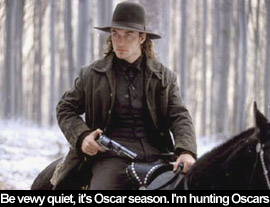*½/****
starring Jude Law, Nicole Kidman, Renée Zellweger, Donald Sutherland
screenplay by Anthony Minghella, based on the novel by Charles Frazier
directed by Anthony Minghella
 by Walter Chaw Existing in an awards-season netherworld where the ugliest girl is Renée Zellweger (or Jena Malone), dad is Donald Sutherland, and Odysseus is Jude Law, Anthony Minghella's Cold Mountain is a tarted-up march to the awards-night podium starring Nicole Kidman, possibly the most over-exposed actor of the last five years. Everything about the film is careful artifice, from its casting to its grandiloquent direction to its half-baked dialogue ("Small moments like a bag of diamonds," indeed), with only Law, Philip Seymour Hoffman, and the magnificent Brendan Gleeson emerging unscathed from the golden wreckage. What Minghella seems best at is recasting edged, emotionally tumultuous novels into sun-kissed temples to the cinematographer's craft, the more dappled sunlight in the eye with which to bedazzle awards-season voters. The strength of Charles Frazier's National Book Award-winning source material lies in its socio-political details of America's Civil War period, but Minghella has focused his picture unerringly on the overrated novel's weaknesses instead: its dialogue, its clumsy Homeric riff (for better country-fried Odyssey, stick to O Brother Where Art Thou?), and its sweeping gothic romance, which finds its characters, at one point, reading the real deal in Wuthering Heights. The result is, like Minghella's previous literary adaptations (The Talented Mr. Ripley and The English Patient), lavish, lugubrious, and off-target.
by Walter Chaw Existing in an awards-season netherworld where the ugliest girl is Renée Zellweger (or Jena Malone), dad is Donald Sutherland, and Odysseus is Jude Law, Anthony Minghella's Cold Mountain is a tarted-up march to the awards-night podium starring Nicole Kidman, possibly the most over-exposed actor of the last five years. Everything about the film is careful artifice, from its casting to its grandiloquent direction to its half-baked dialogue ("Small moments like a bag of diamonds," indeed), with only Law, Philip Seymour Hoffman, and the magnificent Brendan Gleeson emerging unscathed from the golden wreckage. What Minghella seems best at is recasting edged, emotionally tumultuous novels into sun-kissed temples to the cinematographer's craft, the more dappled sunlight in the eye with which to bedazzle awards-season voters. The strength of Charles Frazier's National Book Award-winning source material lies in its socio-political details of America's Civil War period, but Minghella has focused his picture unerringly on the overrated novel's weaknesses instead: its dialogue, its clumsy Homeric riff (for better country-fried Odyssey, stick to O Brother Where Art Thou?), and its sweeping gothic romance, which finds its characters, at one point, reading the real deal in Wuthering Heights. The result is, like Minghella's previous literary adaptations (The Talented Mr. Ripley and The English Patient), lavish, lugubrious, and off-target.
